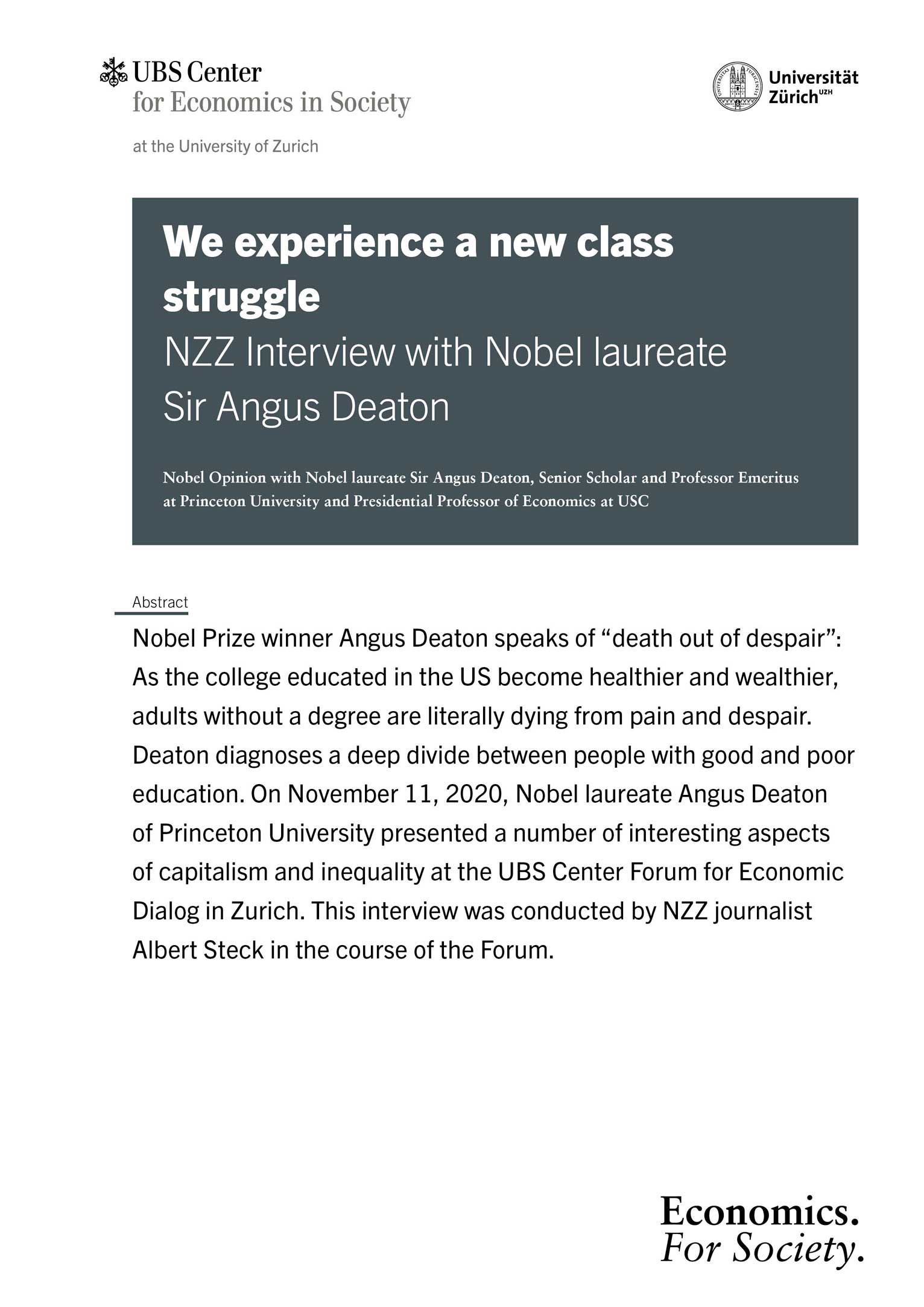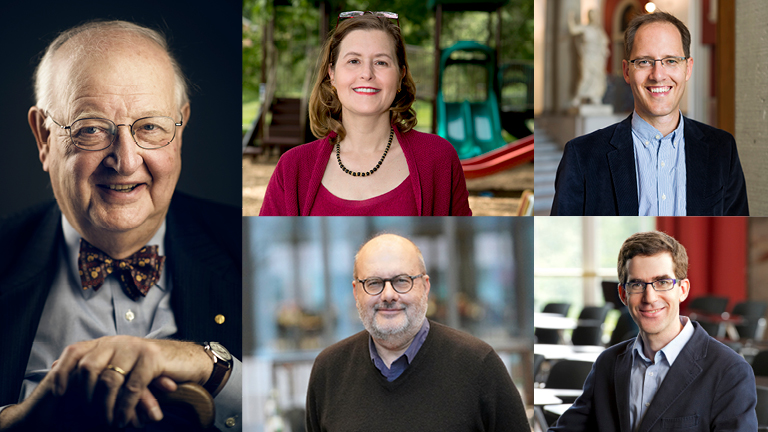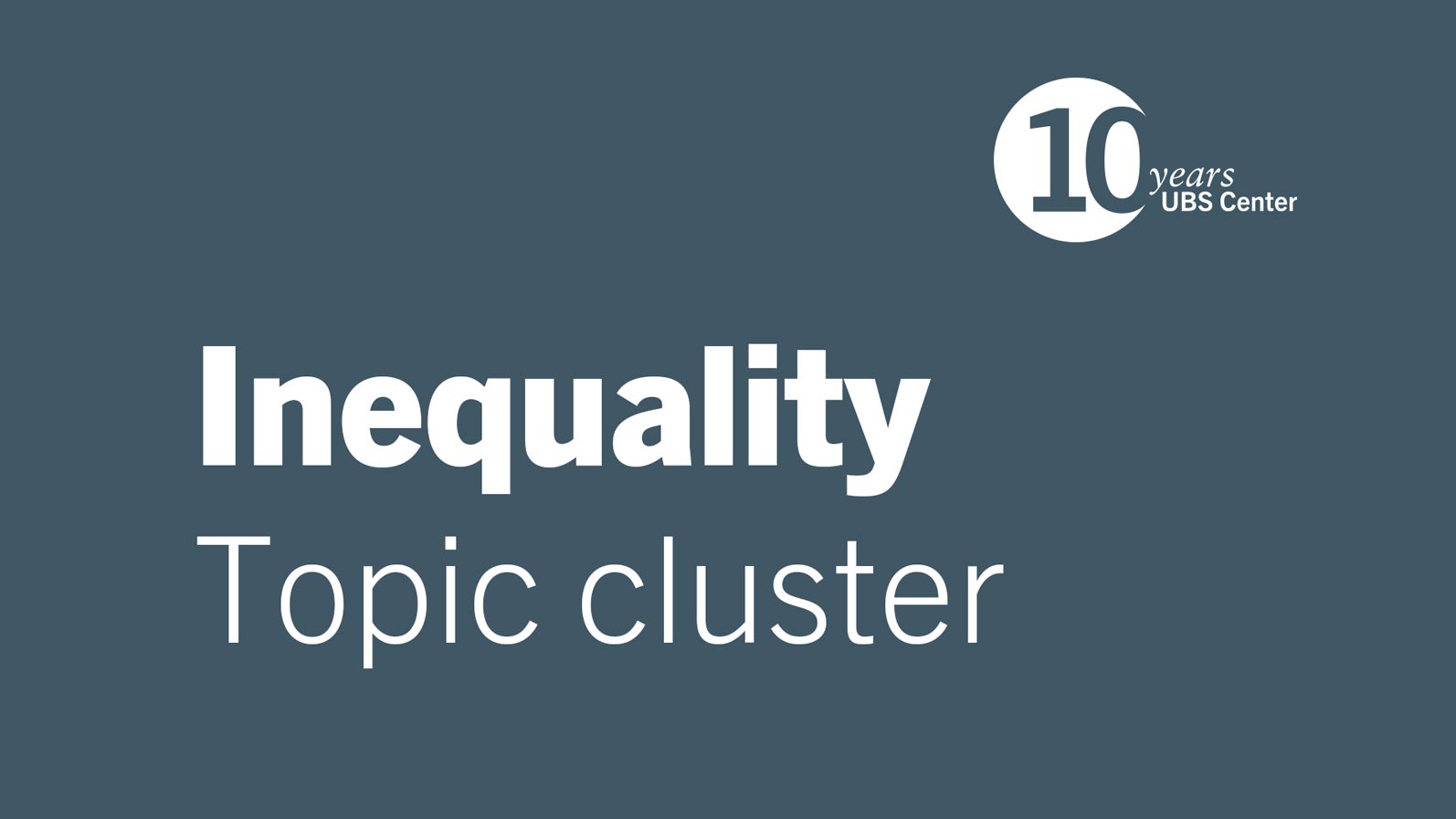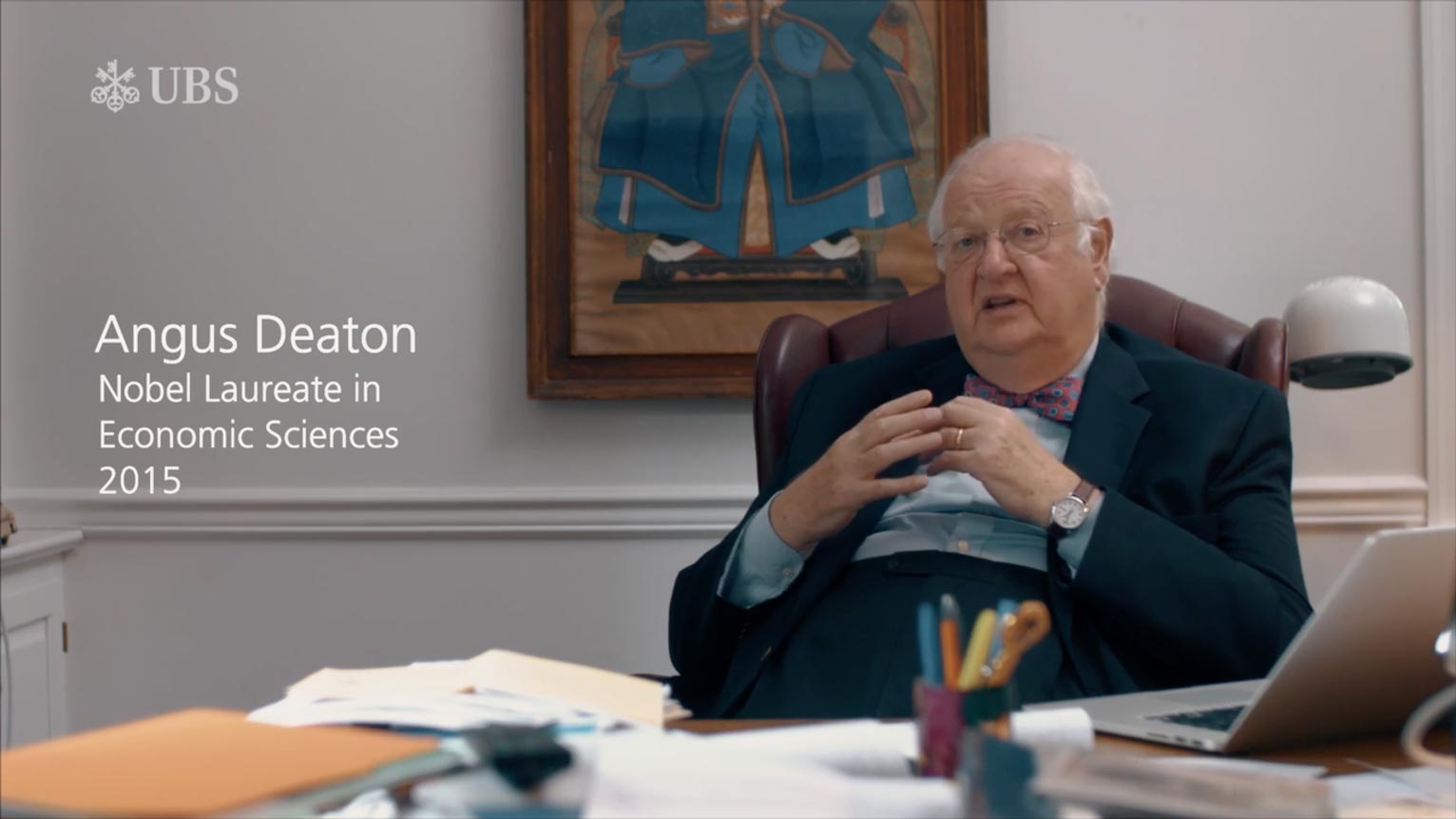We experience a new class struggle
Nobel Prize winner Angus Deaton speaks of “death out of despair”: As the college educated in the US become healthier and wealthier, adults without a degree are literally dying from pain and despair. Deaton diagnoses a deep divide between people with good and poor education. On November 11, 2020, Nobel laureate Angus Deaton of Princeton University presented a number of interesting aspects of capitalism and inequality at the UBS Center Forum for Economic Dialog in Zurich. This interview was conducted by NZZ journalist Albert Steck in the course of the Forum.
This summary is part of a compilation of speeches delivered by Nobel laureates at UBS Center events. We invite you to explore our Nobel Opinions and find out more about their research, their vision, and their solutions to address some of the most pressing issues of our time.
Nobel Prize winner Angus Deaton speaks of “death out of despair”: As the college educated in the US become healthier and wealthier, adults without a degree are literally dying from pain and despair. Deaton diagnoses a deep divide between people with good and poor education. On November 11, 2020, Nobel laureate Angus Deaton of Princeton University presented a number of interesting aspects of capitalism and inequality at the UBS Center Forum for Economic Dialog in Zurich. This interview was conducted by NZZ journalist Albert Steck in the course of the Forum.
This summary is part of a compilation of speeches delivered by Nobel laureates at UBS Center events. We invite you to explore our Nobel Opinions and find out more about their research, their vision, and their solutions to address some of the most pressing issues of our time.

Keynote: Inequality and the future of capitalism
In his half-hour talk, Deaton provides a multi-faceted perspective on the issue of inequality. Right at the beginning he asks: Why is inequality a problem in modern capitalism? Of course, it is a problem when a few dozen individuals control the same amount of wealth as the poorest half of humanity. But capitalism has also brought great prosperity – both in today's rich countries and – over the last 50 years – in poor countries, too. Nevertheless, inequality is a topical issue creating many fronts, such as strong polarization in the US or the worldwide trend towards populism and failing democracy. There are various aspects of inequality that reinforce these processes. What role does capitalism play?
“Capitalism generates inequality, it is in its genes,”
Deaton stresses. We cannot have the benefits without risking the cost. Thus, we must regulate it. Here, Deaton introduces an analogy, comparing capitalism to a casino. The bottom line is that even if all players have the same starting stake and face the same odds, the total number of successes for each player gets more and more unequal over time. How can we tame this growing inequality? Sticking with the analogy, Deaton explains one way out of the casino: While there is nothing inherently bad about inequality – since in the past we learned that economic growth and innovation are often driven by a few which benefits them first, then the rest follows – we should worry about what it enables rich people to do, e.g., via politics. Deaton uses the pharmaceutical industry and healthcare in the US as an example for what can go wrong if there are too weak or no regulations in place. Referring to the opioid catastrophe, he argues that the American pharma was allowed to addict and kill people for money. Today, healthcare costs in the US are through the roof, taking up 18 percent of national income, mostly financed by poll-tax on workers in employment, thereby also destroying low wage labor market. It is an apparatus that distributes upwards, from everyone to the few, held in place by 5 healthcare lobbyists for every member of Congress.
“Antitrust is arguably much too weak: makers turn into takers,”
says Deaton. Thus, we need to repair capitalism through better regulations and restore competition, e.g., fix antitrust, re-orient the courts, enforce rules on lobbying, eliminate tax havens. Still, we need to be aware that some of these measures might have side effects, like stifling innovation. The point is not to eliminate capitalism, but to repair what needs to be repaired – because according to Deaton, capitalism is worth saving after all.
In his half-hour talk, Deaton provides a multi-faceted perspective on the issue of inequality. Right at the beginning he asks: Why is inequality a problem in modern capitalism? Of course, it is a problem when a few dozen individuals control the same amount of wealth as the poorest half of humanity. But capitalism has also brought great prosperity – both in today's rich countries and – over the last 50 years – in poor countries, too. Nevertheless, inequality is a topical issue creating many fronts, such as strong polarization in the US or the worldwide trend towards populism and failing democracy. There are various aspects of inequality that reinforce these processes. What role does capitalism play?
“Capitalism generates inequality, it is in its genes,”
Deaton stresses. We cannot have the benefits without risking the cost. Thus, we must regulate it. Here, Deaton introduces an analogy, comparing capitalism to a casino. The bottom line is that even if all players have the same starting stake and face the same odds, the total number of successes for each player gets more and more unequal over time. How can we tame this growing inequality? Sticking with the analogy, Deaton explains one way out of the casino: While there is nothing inherently bad about inequality – since in the past we learned that economic growth and innovation are often driven by a few which benefits them first, then the rest follows – we should worry about what it enables rich people to do, e.g., via politics. Deaton uses the pharmaceutical industry and healthcare in the US as an example for what can go wrong if there are too weak or no regulations in place. Referring to the opioid catastrophe, he argues that the American pharma was allowed to addict and kill people for money. Today, healthcare costs in the US are through the roof, taking up 18 percent of national income, mostly financed by poll-tax on workers in employment, thereby also destroying low wage labor market. It is an apparatus that distributes upwards, from everyone to the few, held in place by 5 healthcare lobbyists for every member of Congress.
Video
Rethinking inequalities
Forum for Economic Dialogue 2020
In this event series, which took place online due to the Corona pandemic, we focused on different aspects of inequality – a topic that has become even more important in light of the global pandemic and its devastating consequences, which has hit many of the most vulnerable people in the world particularly hard. Experts such as Janet Currie, David Dorn, Branko Milanovic, Florian Scheuer and Nobel laureate Sir Angus Deaton analyzed the determinants and implications of economic and social inequalities and discussed possible solutions on how to address these issues.
Forum for Economic Dialogue 2020
In this event series, which took place online due to the Corona pandemic, we focused on different aspects of inequality – a topic that has become even more important in light of the global pandemic and its devastating consequences, which has hit many of the most vulnerable people in the world particularly hard. Experts such as Janet Currie, David Dorn, Branko Milanovic, Florian Scheuer and Nobel laureate Sir Angus Deaton analyzed the determinants and implications of economic and social inequalities and discussed possible solutions on how to address these issues.

How can we reduce inequality?
Inequality opportunities, and development is a subject area that encompasses numerous current social issues. How can we reduce inequality! What are the causes of social and economic inequality? How can we creat opportunities for women in the labor market? What measures help to combat inequality developing countries?
Inequality opportunities, and development is a subject area that encompasses numerous current social issues. How can we reduce inequality! What are the causes of social and economic inequality? How can we creat opportunities for women in the labor market? What measures help to combat inequality developing countries?

UBS Nobel Perspectives
To help address the big questions that shape our world, UBS has sought out a number of Nobel laureates in Economic Sciences to ask them to share insights, discuss their research, and open their inquiring minds.
Explore the interview with Angus Deaton who talks about his research and elaborates on the question of whether wealth makes you happy.
To help address the big questions that shape our world, UBS has sought out a number of Nobel laureates in Economic Sciences to ask them to share insights, discuss their research, and open their inquiring minds.
Explore the interview with Angus Deaton who talks about his research and elaborates on the question of whether wealth makes you happy.

Speaker
Sir Angus Deaton is Senior Scholar and Professor Emeritus at Princeton University and Presidential Professor of Economics at USC. His interests span domestic and inter¬national issues and include health, happiness, development, poverty, inequality, and how to best collect and interpret evidence for policy. In 2015, he received the Sveriges Riksbank Prize in Economic Sciences in Memory of Alfred Nobel “for his analysis of consumption, poverty, and welfare.”
Sir Angus Deaton is Senior Scholar and Professor Emeritus at Princeton University and Presidential Professor of Economics at USC. His interests span domestic and inter¬national issues and include health, happiness, development, poverty, inequality, and how to best collect and interpret evidence for policy. In 2015, he received the Sveriges Riksbank Prize in Economic Sciences in Memory of Alfred Nobel “for his analysis of consumption, poverty, and welfare.”